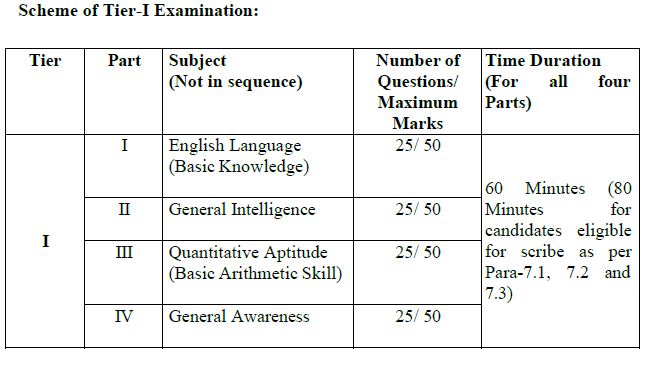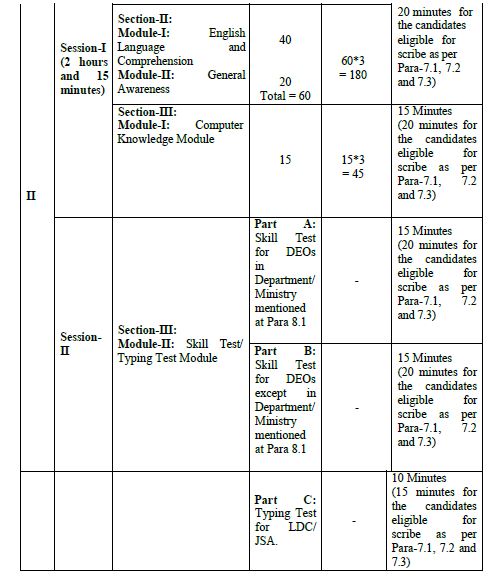SSC CHSL Important dates SSC CHSL Recruitment: Important Dates
SSC CHSL exam schedule is the same as mentioned in the SSC exam calendar. Take a brief look at the SSC CHSL important dates-
|
Events
|
Important Dates
|
|
SSC CHSL Notification Date
|
8th april -2024 |
|
|
|
|
Starting Date of SSC CHSL Apply Online
|
08-04-2024 |
|
Last Date for making fee application
|
08-05-2024 |
|
Last Date of SSC CHSL Apply Online
|
07-05-2024 |
|
Dates of Window for Application Form Correction and online payment
of Correction Charges .
|
10-05-2024 to 11-05 -2024 |
|
Last Date to Pay Offline Fees
|
08-05-2024 |
|
SSC CHSL Admit Card
|
to be announced . |
|
SSC CHSL Exam Date
|
Tier-1 ( June - July , 2024 ) |
|
SSC CHSL Tier 2 Exam Date
|
To be announced |
|
|
|
|
|
|
|
|
|
|
|
|
|
|
|
|
|
|
|
|
|
SSC CHSL Appllication FeeSSC CHSL Application Fees
?
-
Fee payable: Rs 100/- (Rs one hundred only).
-
Wonen candidates and candidates belonging to Scheduled Castes (SC), Sheduled Tribes (ST), Persons with Benchmark Disabilities (PwBD) and Ex-servicemen (ESM) eligible for reservation are exempted from payment of fee.
-
Fee can be paid online through BHIM UPI, Net Banking or by using Visa, MasterCard, Maestro, RuPay Credit or Debit cards .
-
Online fee can be paid by candidates up to 08-05-2024 (23:00 hours)
SSC CHSL EligibilitySSC CHSL 2020 Eligibility Criteria
The eligibility criteria for SSC CHSL can be divided into three categories:
- Nationality of applicants
- Age limit of the applicants
- Educational Qualification
|
Eligibility Criteria
|
Detailed Information
|
|
Nationality / Citizenship
|
- A candidate must be either- Citizen of India/Nepal/Bhutan
- A Tibetan refugee who came over to India, before the 1st January 1962 with the intention of permanently settling in India, or
- A person of Indian origin who has migrated from Pakistan, Burma, Sri Lanka, East African countries of Kenya, Uganda, the United Republic of Tanzania(Formerly Tanganyika and Zanzibar), Zambia, Malawi, Zaire, Ethiopia and Vietnam with the intention of permanently settling in India.
|
|
Educational Qualification
|
- In order to be eligible for SSC CHSL Exam, you must have passed 12th Standard
- or equivalent examination from a recognized Board or University.
- If the applicant possess any Degree obtained through open Universities or Distance Education Mode, then that must be recognized by Distance Education Council, IGNOU.
|
|
Skill Test Eligibility
|
- The applicant must have passed 12th standard in science stream with Mathematics as a subject from a recognized Board or equivalent. (Data Entry Operator Post Only)
|
SSC CHSL Age Limit 2024
The crucial date for age reckoning is fixed as 01-08-2024 in accordance with the provisions of DoP&T OM No. 140l7 /70/87-Estt.(RR) dated 14-07-1988. Age limit for the posts is 18-27 years i.e. Candidates born not before 02-08-1997 and not later than 01-08-2006 are eligible to apply.
Those applicants who are seeking information regarding SSC CHSL age relaxation can refer to the table below:
|
Category
|
Age Relaxation
|
|
SC/ST
|
5 Years
|
|
OBC
|
3 Years
|
|
PwBD (Unreserved)
|
10 Years
|
|
PwBD (OBC)
|
13 Years
|
|
PwBD (SC/ ST)
|
15 Years
|
SSC CHSL Exam patternSSC CHSL Selection Procedure 2024

Scheme of Tier -2


SSC CHSL Vacancies SSC CHSL Vacancy-2024
Tentative vacancies: There are approx. 3712 vacancies. However, firm number of vacancies will be determined in due course. Updated vacancies, if any, along with post-wise & category-wise vacancies will be made available on the website of the Commission (https://ssc.gov.in> Candidate’s Corner> Tentative Vacancy) in due course. Candidates may note that State-wise/ Zone-wise vacancies are not collected by the Commission.
SSC CHSL SyllabusSSC CHSL Tier 1 Syllabus 2024
Indicative Syllabus (Tier-I):
English Language: Spot the Error, Fill in the Blanks, Synonyms/ Homonyms, Antonyms, Spellings/ Detecting mis-spelt words, Idioms & Phrases, One word substitution, Improvement of Sentences, Active/ Passive Voice of Verbs, Conversion into Direct/ Indirect narration, Shuffling of Sentence parts, Shuffling of Sentences in a passage, Cloze Passage, Comprehension Passage.
General Intelligence: It would include questions of both verbal and non-verbal type. The test will include questions on Semantic Analogy, Symbolic operations, Symbolic/ Number Analogy, Trends, Figural Analogy, Space Orientation, Semantic Classification, Venn Diagrams, Symbolic/ Number Classification, Drawing inferences, Figural Classification, Punched hole/ pattern-folding & unfolding, Semantic Series, Figural Pattern-folding and
completion, Number Series, Embedded figures, Figural Series, Critical Thinking, Problem Solving, Emotional Intelligence, Word Building, Social Intelligence, Coding and de-coding, Numerical operations, Other sub-topics, if any.
Quantitative Aptitude:
- Number Systems: Computation of Whole Number, Decimal and Fractions, Relationship between numbers.
- Fundamental arithmetical operations: Percentages, Ratio and Proportion, Square roots, Averages, Interest (Simple and Compound), Profit and Loss, Discount, Partnership Business, Mixture and Allegation, Time and distance, Time and work.
- Algebra: Basic algebraic identities of School Algebra and Elementary surds (simple problems) and Graphs of Linear Equations.
- Geometry: Familiarity with elementary geometric figures and facts: Triangle and its various kinds of centres, Congruence and similarity of triangles, Circle and its chords, tangents, angles subtended by chords of a circle, common tangents to two or more circles.
- Mensuration: Triangle, Quadrilaterals, Regular Polygons, Circle, Right Prism, Right Circular Cone, Right Circular Cylinder, Sphere, Hemispheres, Rectangular Parallelepiped, Regular Right Pyramid with triangular or square Base.
- Trigonometry: Trigonometry, Trigonometric ratios, Complementary angles, Height and distances (simple problems only) Standard Identities like sin2?? + Cos2??=1 etc.,
- Statistical Charts: Use of Tables and Graphs: Histogram, Frequency polygon, Bar-diagram, Pie-chart.
- General Awareness: Questions are designed to test the candidate?s general awareness of the environment around him and its application to society. Questions are also designed to test knowledge of current events and of such matters of everyday observation and experience in their scientific aspect as may be expected of an educated person. The test will also include questions relating to India and its neighboring countries especially pertaining to History, Culture, Geography, Economic Scene, General policy and scientific research.
- For VH candidates of 40% and above visual disability, there will be no component of Maps/Graphs/Diagrams/Statistical Data in the General Intelligence and Quantitative Aptitude parts.
Indicative Syllabus (Tier-II)
- Module-I of Session-I (Mathematical Abilities):
- Number Systems: Computation of Whole Number, Decimal and Fractions, Relationship between numbers.
- Fundamental arithmetical operations: Percentages, Ratio and Proportion, Square roots, Averages, Interest (Simple and Compound), Profit and Loss, Discount, Partnership Business, Mixture and Alligation, Time and distance, Time and work.
- Algebra: Basic algebraic identities of School Algebra and Elementary surds (simple problems) and Graphs of Linear Equations.
- Geometry: Familiarity with elementary geometric figures and facts: Triangle and its various kinds of centres, Congruence and similarity of triangles, Circle and its chords, tangents, angles subtended by chords of a circle, common tangents to two or more circles.
- Mensuration: Triangle, Quadrilaterals, Regular Polygons, Circle, Right Prism, Right Circular Cone, Right Circular Cylinder, Sphere, Hemispheres, Rectangular Parallelepiped, Regular Right Pyramid with triangular or square Base.
- Trigonometry: Trigonometry, Trigonometric ratios, Complementary angles, Height and distances (simple problems only) Standard Identities like sin2?? + Cos2??=1 etc.
- Statistics and probability: Use of Tables and Graphs: Histogram, Frequency polygon, Bar-diagram, Pie-chart; Measures of central tendency: mean, median, mode, standard deviation; calculation of simple probabilities.
Module-II of Section-I (Reasoning and General Intelligence):
- Questions of both verbal and non-verbal type. These will include questions on Semantic Analogy, Symbolic operations, Symbolic/ Number Analogy, Trends, Figural Analogy, Space Orientation, Semantic Classification, Venn Diagrams, Symbolic/ Number Classification, Drawing inferences, Figural Classification, Punched hole/ pattern-folding & unfolding, Semantic Series, Figural Pattern-folding and completion, Number Series, Embedded figures, Figural Series, Critical Thinking, Problem Solving, Emotional Intelligence, Word Building, Social Intelligence, Coding and de- coding, Numerical operations, Other sub- topics, if any.
Module-I of Section-II (English Language And Comprehension):
Vocabulary, grammar, sentence structure, synonyms, antonyms and their correct usage; Spot the Error, Fill in the Blanks, Synonyms/ Homonyms, Antonyms, Spellings/ Detecting mis-spelt words, Idioms & Phrases, One word substitution, Improvement of Sentences, Active/ Passive Voice of Verbs, Conversion into Direct/ Indirect narration, Shuffling of Sentence parts, Shuffling of Sentences in a passage, Cloze Passage, Comprehension Passage. To test comprehension, two or more paragraphs will be given and questions based on those will be asked. At least one paragraph should be a simple one based on a book or a story and the other paragraph should be based on current affairs editorial or a report.
Module-II of Section-II (General Awareness):
Questions are designed to test the candidates? general awareness of the environment around them and its application to society. Questions are also designed to test knowledge of current events and of such matters of everyday observation and experience in their scientific aspect as may be expected of an educated person. The test will also include questions relating to India and its neighboring countries especially pertaining to History, Culture, Geography, Economic Scene, General policy and scientific research.
Module-I of Section-III of Paper-I (Computer Proficiency):
Computer Basics: Organization of a computer, Central Processing Unit (CPU), input/ output devices, computer memory, memory organization, back- up devices, PORTs, Windows Explorer, Keyboard shortcuts.
- Software: Windows Operating system including basics of Microsoft Office like MS word, MS Excel and Power Point etc..
- Working with Internet and e-mails: Web Browsing & Searching, Downloading & Uploading, Managing an E-mail Account, e-Banking.
- Basics of networking and cyber security: Networking devices and protocols, Network and information security threats (like hacking, virus, worms, Trojan etc.) and preventive measures.
- For VH candidates of 40% and above visual disability, there will be no component of Maps/ Graphs/ Diagrams/ Statistical Data in the Mathematical Abilities and Reasoning and General Intelligence modules.